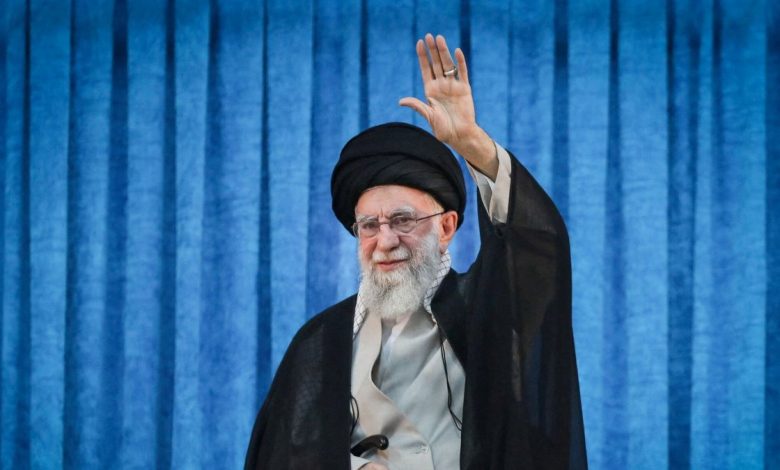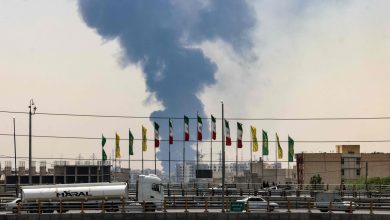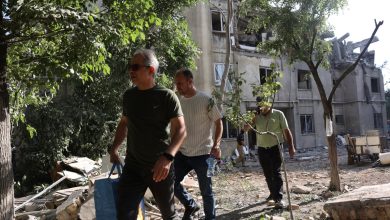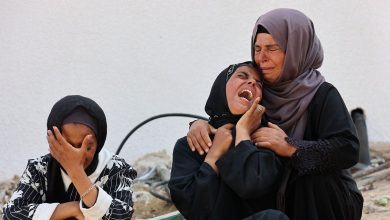Iran unleashes over 100 drones at Israel after nuclear site attack

[ad_1]
After Israel launched a sweeping overnight assault on Iran’s nuclear facilities, the Islamic Republic retaliated with a wave of more than 100 drones, the Israeli military said Friday.
Military spokesperson Rear Adm. Daniel Hagari confirmed that Israeli air defenses were actively intercepting the incoming drones.
The retaliatory barrage followed Israel’s massive air campaign, in which about 200 fighter jets struck more than 100 strategic targets across Iran, including nuclear facilities. According to Hagari, the operation deployed 330 munitions in a coordinated effort to cripple Tehran’s nuclear and missile infrastructure.
The Tasnim news agency, considered a mouthpiece for Iran’s Islamic Revolutionary Guard Corps, reported that IRGC Commander in Chief Hossein Salami and Chief of Staff Gen. Mohammad Bagheri were killed in the strikes.
Iran’s Supreme Leader Ayatollah Ali Khamenei vowed Israel would face “harsh punishment,” according to a statement from his office. Israeli Defense Minister Yoav Gallant declared a state of emergency and urged citizens to take precautions.
Israeli Prime Minister Benjamin Netanyahu described the assault as a “very successful opening strike.” He said senior Iranian military leaders and scientists involved in nuclear weapons development were targeted, along with key nuclear sites.
He vowed to continue the operation “for as many days as it takes to remove this threat.”
Airspace was shut down across multiple Middle Eastern countries – including Israel, Iran, Jordan and Iraq – due to the dramatic escalation.
Netanyahu claimed Israel had hit the core of Iran’s uranium enrichment program.
The uranium enrichment facility in Natanz was “among the targets,” International Atomic Energy Agency Director General Rafael Mariano Grossi announced on X, calling the situation “deeply concerning.”
State television showed smoke rising from the Natanz facility in central Iran.
IAEA inspectors currently in Iran remain in contact with agency headquarters in Vienna, Grossi said. He later reported that Iranian authorities informed the agency no increase in radiation levels had been detected at the site.
The Natanz facility produces uranium enriched up to 60% purity – a level considered nearly weapons-grade. According to the IAEA, this material could be further enriched to 90%, the threshold needed for nuclear weapons, with relatively little effort.
Tehran has consistently denied it intends to build nuclear weapons.
The U.S. was not involved in Israel’s attack, according to officials in Washington. President Donald Trump said he would meet with his National Security Council on Friday and still hopes for a return to nuclear talks.
In an interview with Fox News, Trump repeated that Iran must not acquire a nuclear bomb and expressed a desire to resume negotiations.
He warned that the U.S. would defend both itself and Israel if Iran retaliates.
Trump had repeatedly warned Iran in recent months that military action could follow a breakdown in diplomacy. Negotiations were reportedly scheduled for Sunday, but that was before Israel’s strike.
Iran’s Foreign Ministry condemned the Israeli operation as a “clear violation of the United Nations Charter.”
The ministry added that Israel’s actions could not have occurred without U.S. coordination and approval – making Washington equally responsible for the consequences.
U.S. Secretary of State Marco Rubio warned Tehran in a statement not to target American personnel or facilities.
[ad_2]
Source link






